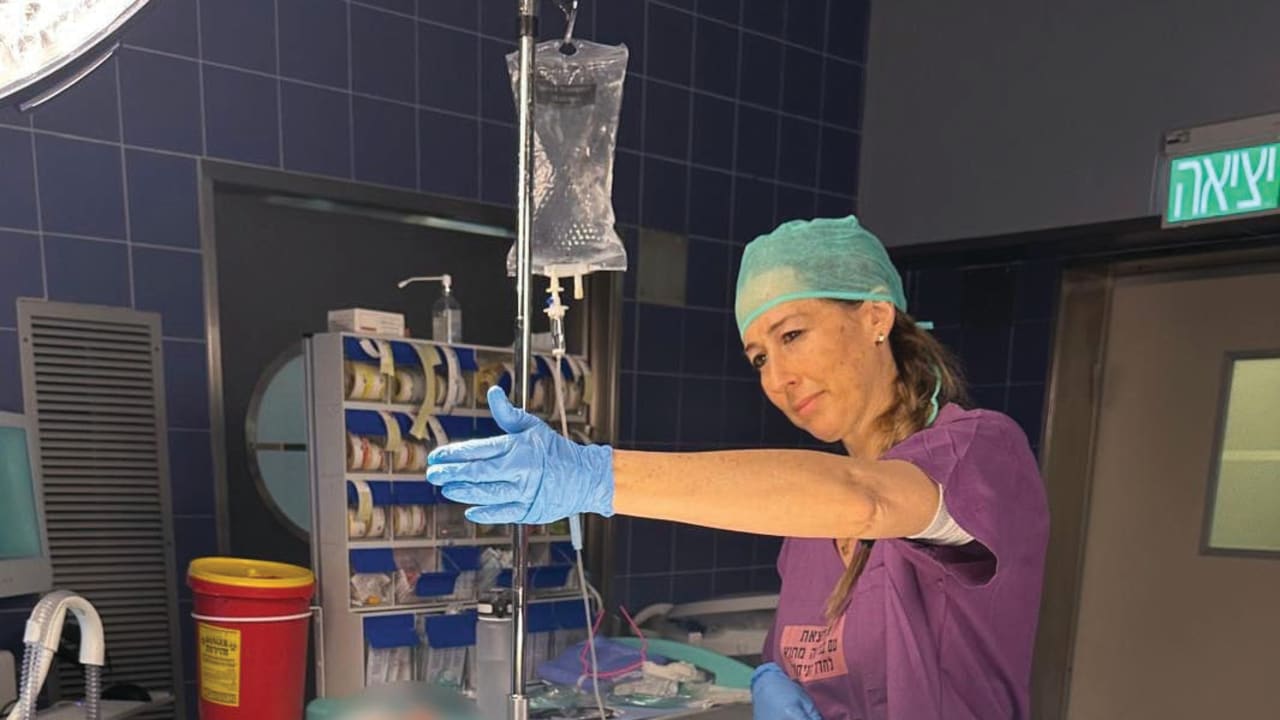ByJUDY SIEGEL-ITZKOVICH
Patients suffering from obesity wore hospital gowns and lay on the operating table, but instead of anesthesia, they underwent an experience of imaginary gastric bypass surgery using hypnosis.
Physicians are not supposed to fool their patients, but in unique procedures at Jerusalem’s Hadassah-University Medical Center on Mount Scopus, the patients knew about it in advance, and it made them better.
In the hospital’s surgical department, a groundbreaking clinical study is currently underway – the first of its kind in the world.
Maya Mizrahi, a medical psychologist and licensed hypnotist who developed the innovative intervention “hypnotic sleeve surgery,” dressed as a surgeon and led the patients into the cold, well-lit operating room. Patients suffering from extreme obesity wore hospital gowns and lay on the operating table, but instead of anesthesia and a scalpel, they underwent an experience of imaginary gastric bypass surgery using hypnosis alone. The operations were all held on Fridays, when the rooms are usually empty.
No abdominal incision was actually made; the patients only thought – thanks to hypnosis – that they had been through bariatric (stomach-shortening) surgery, restricting the amount of food the stomach can hold, reducing nutrient absorption, or a combination of both.
Non-surgical success
The initial results have been impressive. Out of 41 participants, 86% are in the process of losing weight following the “hypnotic surgery” – a particularly impressive figure for a non-invasive intervention.
With a team that included doctors, surgeons, and researchers from Hadassah and the Hebrew University of Jerusalem, the effect of the process on weight loss and other emotional indicators is being examined. Dr. Ronit Greenbaum, a senior bariatric surgeon at the hospital, is a participant in the “surgery.”
So far, 41 obese patients have participated in the study; 19 had previously undergone gastric bypass surgery in the past and experienced a regain in weight, and 22 who had not were the control group.
“There has been hypnotism of patients whose brains thought they were undergoing stomach-shortening surgery, but we are the only ones to conduct medical research on its success and the first to do it in an operating room, with all the preparations of regular surgery – fasting before, wearing a surgical gown, having an electrocardiogram, and wearing compression stockings,” recalled Mizrahi.
“The physician in charge inserts an infusion, and the patient receives an explanation of the scalpels and other equipment – the anatomy involved. Antiseptic is rubbed on the abdomen, an oxygen mask is placed on the face, and he is attached to a monitor.”
After putting the patient into a hypnotic state, Mizrahi describes the surgical procedure to the patient step by step – the equipment, the incision, the staples – as if a real surgery were indeed taking place.
“The brain doesn’t know how to distinguish between reality and imagination, so a situation is created whereby the brain ‘believes’ that it’s undergoing the operation and thus activates the desired feelings of satiety, self-control, and motivation for change,” she explained.
There are about 600 medical hypnotists in Israel – all physicians, dentists, or psychologists who have undergone special training and supervision. “About 95% of the population can be successfully hypnotized,” she continued. “Even a weak trance is enough. I first check that the patient does not suffer from depression, post-trauma, or other emotional problems; [if they do,] I don’t treat them. The patient knows it’s all a performance, but the brain is persuaded. We concentrate on breathing or other techniques to induce a trance.”
MIZRAHI HAS used hypnosis to relieve excessive sweating (hyperhidrosis), instead of cutting a nerve attached to the sweat glands or injecting Botox; mitigate psoriasis; or alleviate irritable bowel syndrome, but she has not done it in an operating room. She would like to teach other medical hypnotists to use this technique.
Bariatric surgery is less popular today than previously because long-term success requires a long-term commitment to lifestyle and dietary changes, and many are unable to persevere. Some studies show that the incidence of regaining at least 10% of initial weight loss can be as high as 72% after five years, while other research indicates that about one-quarter of patients may regain all their lost weight within a decade. In addition, there are injections that cause weight loss, although these can involve side effects.
“In the pre-surgery meeting, I ask them to write their surgery story so I can create a custom ‘script’ for more accurate reconstruction under hypnosis,” she continued. “I create a play for the brain. At the end, they open their eyes after the brain has had an empowering experience and received suggestions that affect consciousness, an experience that allows for ‘rebirth.’
“This combination gives the brain a powerful sensation through all the senses and thus strengthens the placebo effect of the simulated surgery. In addition, for bariatric patients who have had surgery in the past and gained weight again, the sensory experience also allows for a renewed memory of the surgery and a reactivation of the positive consequences of the previous surgery.”
Each patient attends six individual sessions – a preparatory meeting, the hypnotic surgery experience, and a process that includes self-hypnosis practice and follow-up talks. They also get monthly phone calls for a year and a booklet of nutritional instructions, as do patients who actually undergo surgery.
“Hypnosis is not a magic trick but rather a tool that allows us to listen to the body and its internal processes. Through the intervention, we try to understand the role of eating and of obesity,” she noted.
Yuval Wollhandler, a 45-year-old Clalit Health Services nurse, met Mizrahi after his brother saw an advertisement about the study. “I had gained a lot of weight, especially during my military service in the past two years. When I reached Maya, I weighed 134 kg.”
As a medical professional, he didn’t hesitate when he heard about the hypnotic technique. “It’s partly related to the subconscious and decision-making around food. I thought I had a golden opportunity here before I would have to undergo actual surgery. My goal is to lose more and then buy new clothes in a smaller size.”
V., from Jerusalem, who participated in the study, said, “I lost 18 kg., and I’m still in the process of losing more. Four years ago, I underwent bariatric surgery and lost 60 kg., but three years later, I was myself ‘stealing’ food and returning to my old habits. I gained 17 kg.”
She was skeptical about hypnosis but decided to meet with Mizrahi. “I met a very professional and precise, serious, and credible person.” Three months after the procedure, she’s already lost 18 kg. “I don’t crave snacks I used to love.”
Prof. Haggi Mazeh, head of the hospital’s surgical department, commented that the study “is a step forward; our department promotes innovation, and this is another tool offered to obese patients. In another few months, if physiological changes shown in blood tests of the levels of hormones ghrelin and leptin are ready, it will be an incredible breakthrough. Nobody has done this before.”


















